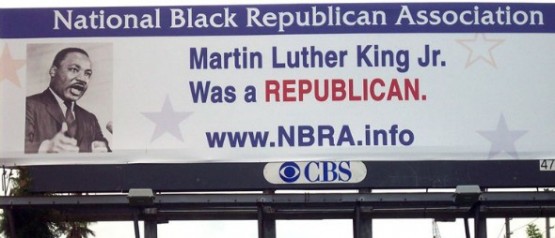
“Most people don’t talk about the fact that Martin Luther King was a Republican.”
That’s a quote from Ada Fisher, a Republican National Committeewoman from North Carolina, that was published without qualification or correction this week by ABC News.
Fisher is wrong on two fronts. First, many people talk about the “fact” that King was a Republican. It is asserted incessantly by conservatives on Twitter and elsewhere on the internet, especially in the lead up to today’s 50th anniversary of the March on Washington. The claim is most prominently advanced by King’s niece, Republican activist Alveda King. Over the years, conservative groups have purchased billboards making the claim.
Second, Martin Luther King Jr. was not a Republican. Or a Democrat.
King was not a partisan and never endorsed any political candidate. In a 1958 interview, King said “I don’t think the Republican party is a party full of the almighty God nor is the Democratic party. They both have weaknesses … And I’m not inextricably bound to either party.”
King did, however, weigh in on the Republican party during his lifetime. In Chapter 23 of his autobiography, King writes this about the 1964 Republican National Convention:
The Republican Party geared its appeal and program to racism, reaction, and extremism. All people of goodwill viewed with alarm and concern the frenzied wedding at the Cow Palace of the KKK with the radical right. The “best man” at this ceremony was a senator whose voting record, philosophy, and program were anathema to all the hard-won achievements of the past decade.
Senator Goldwater had neither the concern nor the comprehension necessary to grapple with this problem of poverty in the fashion that the historical moment dictated. On the urgent issue of civil rights, Senator Goldwater represented a philosophy that was morally indefensible and socially suicidal. While not himself a racist, Mr. Goldwater articulated a philosophy which gave aid and comfort to the racist. His candidacy and philosophy would serve as an umbrella under which extremists of all stripes would stand. In the light of these facts and because of my love for America, I had no alternative but to urge every Negro and white person of goodwill to vote against Mr. Goldwater and to withdraw support from any Republican candidate that did not publicly disassociate himself from Senator Goldwater and his philosophy.
King barnstormed the country on behalf on Johnson in 1964, “maintaining only a thin veneer of nonpartisanship,” according to biographer Nick Kotz. King called Johnson’s win a “great victory for the forces of progress and a defeat for the forces of retrogress.”
Here is what King had to say about Ronald Reagan, the hero of modern Republicans:
When a Hollywood performer, lacking distinction even as an actor can become a leading war hawk candidate for the Presidency, only the irrationalities induced by a war psychosis can explain such a melancholy turn of events.
David Garrow, who wrote a Pulitzer Prize winning biography of King, stated “It’s simply incorrect to call Dr. King a Republican.”
King, according to Garrow, did hold some Republicans — including Richard Nixon and Nelson Rockefeller — in high regard. He also was harshly critical of Lyndon Johnson’s escalation of the Vietnam War.
In 2008, King’s son Martin Luther King III said “It is disingenuous to imply that my father was a Republican. He never endorsed any presidential candidate, and there is certainly no evidence that he ever even voted for a Republican.” Garrow claimed there is little doubt King voted for Kennedy in 1960 and Johnson in 1964.
Also, despite what you might hear from conservatives like Glenn Beck or Sean Hannity or the idiot in the office:
1. Martin Luther King was against prayer in school and thought that Christianity meant that you had to help the poor.
2. Martin Luther King thought America's use of military power was immoral and that protesters loved their country.
3. This is not to mention that Martin Luther King thought that money spent on useless wars would be better spent on anti-poverty programs.
4. Unlike today's Democrats, Martin Luther King believed that radical activism, even at the risk of arrest, was more important than moderation and compromise. Principle over popularity.
5. Martin Luther King believed that a janitor was as important as a doctor and that the government had the duty to ensure that the janitor was taken care of as well as the doctor was, including a guaranteed wage, health care, and more.
6. Martin Luther King believed that the rich needed to pay their fair share to help lift people out of poverty. They should, you know, spread the wealth, especially through taxation.
7. And, after a change of heart, Martin Luther King did not believe in owning a gun.

